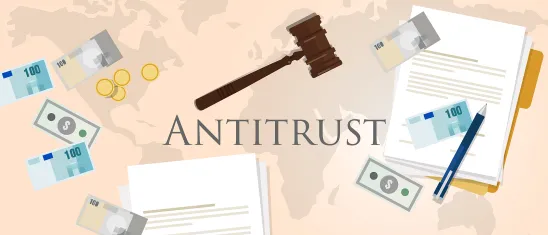KEY THEMES AND TAKEAWAYS
UNITED STATES
-
Litigation Losses Pile Up for DOJ and FTC
The US Department of Justice (DOJ) and the Federal Trade Commission (FTC) lost four merger challenges (Illumina/GRAIL, UnitedHealth/Change Healthcare, U.S. Sugar/Imperial Sugar and Booz Allen/EverWatch) in September. The losses demonstrate that parties willing to litigate can have success in court.
-
Federal Trade Commission v. Illumina, Inc., and GRAIL, Inc. The administrative law judge (ALJ) rejected the FTC’s vertical theory and credited a proposed fix. The FTC staff has appealed the initial decision to the full Commission for a final order.
-
US v. U.S. Sugar Corp. et al. The judge disagreed with the proposed southeast US geographic market and was persuaded that the government could adjust the supply of imported sugar to defeat an attempted price increase. The DOJ has appealed.
-
US v. UnitedHealth Group Inc. et al. The DOJ lost on both horizontal and vertical theories. The judge found that the horizontal issue was remedied by the parties’ proposed divestiture of an overlapping business to a private equity buyer and the vertical theory was countered by the real-world evidence presented at trial. The DOJ did not appeal this decision.
-
US v. Booz Allen Hamilton Holding Corporation, Booz Allen Hamilton Inc., EverWatch Corp., EC Defense Holdings, LLC and Analysis, Computing & Engineering Solutions, Inc. While the opinion in this case was made public during Q4 of 2022, and thus will be discussed in more detail in our next Snapshot, the court announced its decision in September.
The absence of “smoking gun” documents and lack of a presumption of anticompetitive effects (based on market shares and concentration) made these cases very difficult for the government. The judges in these cases tended to credit structural and behavioral remedies that the government felt were insufficient and were persuaded by real-world testimony from executives and third parties contradicting the government’s theories of changed economic incentives from the transactions.
-
Kanter Delivers Speech on “Respecting the Antitrust Laws and Reflecting Market Realities”
Assistant Attorney General Jonathan Kanter delivered the keynote speech at Georgetown’s Antitrust Law Symposium on September 13, 2022, in which he highlighted the detriments of underenforcement and noted that the antitrust community has reached an inflection point in enforcement efforts. Kanter vowed that the Antitrust Division is “firing on all cylinders, working to use every tool [it has] available to promote competition and meet the moment.” Kanter noted that the division is litigating more than it has in years, with six pending civil antitrust lawsuits (the most civil cases litigated in the last two decades), more merger trials than any fiscal year on record and the most criminal indictments in almost four decades.
Kanter also mentioned the more than 5,000 public comments received in response to the proposed revisions of the merger guidelines and noted that the overwhelming majority of comments spoke to the desire for stronger enforcement. DOJ and FTC staff are currently preparing a draft of these revised guidelines. Until the new guidelines are published, it is difficult to predict how much weight courts will give the revised guidelines in view of existing case law and precedent.
Kanter also testified before the Senate Judiciary Subcommittee on Competition Policy, Antitrust, and Consumer Rights. He committed to bringing “difficult” antitrust cases and vowed to build a team of litigators prepared for the challenge.
-
No US Consent Orders During the Quarter
FTC and DOJ leadership have touted their reticence to settle what they view as problematic transactions, and instead seek full-stop injunctions in court. In line with that rhetoric, no matters were settled by consent orders allowing the transaction to proceed during this quarter.
EUROPEAN UNION
-
EU Lawmakers and Member-State Governments Agree on Rules to Address Distortive Foreign Subsidies
In July 2022, the European Parliament published the final text of the European Union’s upcoming instrument to address distortive foreign subsidies, following a provisional political agreement reached between the EU lawmakers in June (Foreign Subsidies Regulation). The Foreign Subsidies Regulation introduces a new mandatory screening mechanism including notification obligations and the European Commission’s right of ex officio investigations, which will have a considerable impact on M&A transactions and procurement procedures. The Foreign Subsidies Regulation provides the following:
-
Transactions will have to be notified to the Commission prior to their completion if the target company, one of the acquiring companies or the joint venture to be formed has generated revenues of more than EUR 500 million in the European Union and the financial contributions from third countries have exceeded EUR 50 million over the three preceding years.
-
In public procurement procedures with a contract value of more than EUR 250 million, companies will have to report all third-country financial contributions (such as the transfer of funds or liabilities, the foregoing of revenue otherwise due, and the provision or purchase of goods or services) they have received in the last three years.
-
Outside the scope of notifiable transactions, the Commission may also decide to examine whether a foreign subsidy leads to a distortion of competition.
If the Commission concludes that a foreign subsidy is likely to create distortions in the internal market, it may impose redressive measures such as the following:
-
Obligations to grant fair and non-discriminatory access conditions for certain infrastructure that was acquired or supported by the distortive foreign subsidies
-
Reduction in the capacity or market presence of the undertaking that received a distortive foreign subsidy
-
Refraining from certain investments
-
Licensing at fair, reasonable and non-discriminatory terms and conditions for assets that were acquired or developed with the help of third-country subsidies
-
Publication of the results of research and development
-
Divestiture of certain assets.
In certain cases, the Commission may even order the unwinding of a transaction and the repayment of the foreign subsidy, including reasonable interest.
The Foreign Subsidies Regulation will enter into force once it is formally adopted by EU lawmakers and published in the Official Journal. It will become directly applicable across the European Union six months after entry into force. The notification obligations will start to apply nine months after entry into force. The Commission also is currently drafting procedural rules on how to notify transactions, how to calculate time limits, and the process for preliminary reviews and in-depth probes when there is a suspicion of distortive foreign subsidies.
ENFORCEMENT IN KEY INDUSTRIES1

SNAPSHOT OF SELECTED ENFORCEMENT ACTIONS

NOTABLE US CASES
| PARTIES | AGENCY | CASE TYPE | MARKETS / STRUCTURE (AS AGENCY ALLEGED) | SUMMARY & OBSERVATIONS |
| Illumina / GRAIL | FTC | Challenged and appealed | Research, development and commercialization of MCED tests in the United States |
The FTC alleged that Illumina’s proposed acquisition of GRAIL would bring together the only viable supplier of next generation sequencing (NGS) platforms and the leading producer of multi-cancer early detection (MCED) tests. MCED tests rely on NGS platforms, and the FTC alleged that this would incentivize Illumina to raise prices, withhold supply, or decrease quality of products or services to GRAIL’s rivals.
The ALJ rejected the FTC’s vertical merger challenge. The ALJ found that complaint counsel (i.e., the FTC staff) had not shown that the transaction would create an incentive for Illumina to withhold its genomic sequencing product from GRAIL’s cancer detection test rivals. While the ALJ found that gene sequencing was critical to test development and Illumina was the only viable supplier, he also found that GRAIL had no meaningful rivals because other tests would not be good substitutes for GRAIL’s and would not take meaningful sales from GRAIL. The ALJ also found that an “open offer” by Illumina to supply its gene sequencing product to all oncology test developers, with defined terms and prices, prevented Illumina from withholding its product or raising its prices. Complaint counsel has appealed the decision to the FTC commissioners. |
| UnitedHealth / Change Healthcare | DOJ | Challenge rejected and transaction completed | Two of the largest technology and service companies in healthcare technology |
UnitedHealth Group, which owns the largest health insurer in the United States, sought to acquire Change Healthcare, the leading source of key technologies on which health insurance companies rely.
DOJ alleged both horizontal and vertical theories. On the horizontal theory, DOJ alleged that the combination of UnitedHealth and Change Healthcare would create an entity with a market share of more than 80% in first-pass claims editing for medical claims that providers submit to insurers (payors). The parties, however, had agreed to divest Change Healthcare’s first-pass claims editing business (ClaimsXten, the stronger of the two claims editing businesses) to private equity firm TPG Capital. DOJ suggested TPG would be unable to replicate the competitive intensity that existed before the proposed transaction because it would not have the same broad portfolio of products as Change Healthcare, but US District Judge Carl Nichols found that the divestiture resolved the horizontal competition concerns. On the vertical theory, DOJ alleged that by acquiring Change Healthcare and its electronic data interchange clearinghouse, UnitedHealth would acquire the ability and incentive to misuse competitively sensitive information that Change Healthcare obtains from competing health insurers by passing that information to UnitedHealth’s insurance business. Judge Nichols was unpersuaded by the DOJ’s incentives theories and focused more on the real-world evidence relating to the following:
In total, Judge Nichols held that the horizontal issue was remedied by the fix and the vertical theory was countered by the evidence at trial. DOJ did not appeal this decision. |
| Penguin Random House / Simon & Schuster | DOJ | Challenged and DOJ won at trial | Two of the five largest publishers (which control ~80% of the trade market for books in the United States); Penguin Random House had a 25% market share in 2020, the largest in the industry | DOJ alleged that Penguin Random House’s (PRH’s) proposed acquisition of Simon & Schuster (S&S) would bring together competitors in the publishing industry. The DOJ alleged the acquisition would allow PRH, the largest book publisher in the world, to exert “unprecedented” influence over which books are published in the United States and how much authors are paid for their work. This would occur because PRH and S&S were the two leading publishers of anticipated best sellers, for which publishers pay large advances to authors. DOJ asserted that the combined entity would drive down the money paid to authors. The court blocked the merger, and we will report further details in the next Snapshot. |
| Booz Allen Hamilton / EverWatch Corp. | DOJ | Challenge rejected | 2 to 1 in modeling and simulation services for the National Security Agency’s Optimal Decision Contract | DOJ alleged Booz Allen’s proposed acquisition of EverWatch would bring together the only two competitors for a government contract to provide operational modeling and simulation services to the National Security Agency (NSA). DOJ alleged that the transaction would eliminate competition for this defense contract and leave the NSA to face a monopoly bidder. In October 2022, the judge released her opinion in favor of the merging parties, and we will report further details in our next Snapshot. |
| U.S. Sugar / Imperial Sugar | DOJ | Challenge rejected and appealed | 3 to 2 in sugar production/manufacturing in the southeast United States |
DOJ alleged that U.S. Sugar’s proposed acquisition of Imperial Sugar would bring together two of the major producers of refined sugar in the southeast United States.
DOJ alleged that the proposed transaction “would leave an overwhelming majority of refined sugar sales across a handful of states in the Southeast in the hands of only two producers,” which would lead to higher prices and harm businesses and consumers. US District Judge Maryellen Noreika rejected both the DOJ’s proposed product market limited to sugar producers (for failing to include distributors and failing to distinguish between different types of customers) and its proposed southeastern US geographic market (because the evidence showed that sugar flows throughout the United States). Judge Noreika also was persuaded by evidence showing that the US Department of Agriculture could adjust sugar supply to defeat an attempted price increase. The DOJ has appealed this decision to the US Court of Appeals for the Third Circuit. |
| Meta / Within Unlimited | FTC | Challenged | Virtual reality dedicated fitness applications and virtual reality fitness applications |
In July, the FTC filed a complaint for a temporary restraining order and preliminary injunction to enjoin Meta’s proposed acquisition of Within Unlimited.
The complaint alleges that Meta’s acquisition of Within and its dedicated fitness application, Supernatural, would substantially harm competition in virtual reality dedicated fitness applications in two ways. First, because Meta is a potential entrant into the market (and is the largest provider of virtual reality devices and a leading provider of virtual reality applications), an acquisition of Within would eliminate this potential entry and thereby reduce future innovation. Second, the mere possibility of Meta’s eventual entry also influenced competition in this market, and without Meta as a potential entrant, the competitive intensity in the market would be reduced. |
NOTABLE EUROPEAN & UK CASES
| PARTIES | AGENCY | CASE TYPE | MARKETS / STRUCTURE (AS AGENCY ALLEGED) | SUMMARY & OBSERVATIONS |
| D’Ieteren (Carglass) / PHE | EC | Cleared, subject to conditions | Provision of vehicle glass repair and replacement services |
On August 2, 2022, the European Commission approved D’Ieteren’s acquisition of PHE. The approval is subject to D’Ieteren’s divestment of Mondial Pare-Brise and its Glass Auto Service label.
D’Ieteren is active in the repair and replacement of vehicle glass in several EU Member States, including France. The brands under its control include Carglass, Safelite and Autoglass. Carglass has a leading position in the French market for the provision of vehicle glass repair and replacement services. It carries out three times as many vehicle glass repair jobs as the next largest competitor and has a strong brand image with consumers. The target company, PHE, is also active in the repair of vehicle glass in France through a network of workshops under the brand Mondial Pare-Brise and through the Glass Auto Service label. The Commission considered whether the transaction would create a market leader and an unavoidable trading partner for many insurers. According to the Commission, insurers would not be able to redirect a significant portion of their business to other specialist networks if the transaction was consummated. The Commission also found that the market is characterized by high barriers to entry due to the time and expense needed to develop a nationwide network. The Commission found that the divestment would fully remove the overlap between the merging parties regarding vehicle glass repair and replacement services activities in France. |
| Bouygues / Equans | EC / CMA | Cleared, subject to conditions | Installation and maintenance services for railway contact lines |
On July 19, 2022, the Commission approved Bouygues’s acquisition of Equans, subject to the divestment of Colas Rail Belgium (including all assets, personnel, and ongoing and future contracts of both its railway contact lines and track installation services).
Both merging parties are global providers of multi-technical and engineering services. Bouygues, via Colas Rail Belgium, and Equans are among a few providers of electrical engineering services for railway contact lines in Belgium and two of only three providers nationwide. The Commission’s investigation found that the merged entity would have high market shares and would face a small number of competitors in future calls for tenders. The Commission also identified significant barriers to entry into the market. As a result of the merger, the Commission expected a price increase for electrical engineering services for railway contact lines in Belgium. With the divestiture, Colas Rail Belgium would remain an independent competitor to Bougyues and Equans in Belgium. The merger was also subject to review by the UK Competition and Markets Authority (CMA). The transaction raised specific competition concerns in July because both firms were bidding for High Speed 2, to supply catenary systems (the overhead power cables used to supply electricity to trains) to high-speed railways in the United Kingdom. On September 27, 2022, the CMA confirmed that the concessions offered by the merging parties were accepted. The deal will therefore not be referred for an in-depth probe. Under the commitments, the merging parties agreed to appoint an independent third-party expert to assess the bids submitted in the High Speed 2 tender by Colas Rail and the Rapide JV. Further, the merged entity agreed to withdraw one of the tenders submitted by Bouygues (through Colas Rail UK) or Equans (through its participation in Rapide JV). |
| Illumina / GRAIL | EC | Challenged | Supply of NGS systems for genetic and genomic analysis |
On September 6, 2022, the Commission prohibited the acquisition of GRAIL by Illumina.
The merger was referred to the Commission by several EU and European Free Trade Association Member States (France, Belgium, Greece, Iceland, the Netherlands and Norway). The transaction did not meet the turnover threshold of the EU Merger Regulation and was not notified to any Member State, but met the criteria for referral under Article 22 of the EU Merger Regulation. The Commission accepted the referral because it believed GRAIL’s competitive significance was not reflected in its turnover. The General Court of the EU upheld the Commission’s referral decision, thereby confirming the Commission’s jurisdiction. Illumina filed an appeal to the Court of Justice. Following an in-depth investigation, the Commission concluded that the merger would stifle innovation and reduce choice in the emerging market for blood-based early cancer detection tests. According to the Commission, the merger would give Illumina the ability and incentive to foreclose GRAIL’s rivals, as both GRAIL and its competitors rely on Illumina’s NGS systems to develop and run their cancer detection tests. Furthermore, NGS-based early cancer detection testing is expected to expand rapidly and to become highly lucrative in the upcoming years. To alleviate competitive concerns, Illumina offered an open license to NGS suppliers to some of Illumina’s NGS patents, a commitment to stop patent lawsuits in the United States and Europe against the NGS supplier BGI Genomics (China) for three years, and a commitment to conclude agreements with GRAIL’s rivals under the conditions set out in a standard contract. The Commission did not accept these proposed remedies, however, and concluded that Illumina would still have the ability and incentive to foreclose GRAIL’s competitors. Further, when Illumina publicly announced the completion of its acquisition of GRAIL in August 2021, the Commission adopted interim measures to restore and maintain the conditions of effective competition. The Commission also opened an investigation to assess whether Illumina breached the “standstill obligation” by implementing the acquisition prior to obtaining the Commission’s merger control approval. If the Commission concludes that the merging parties breached the standstill obligation, it could impose a fine of up to 10% of each company’s annual worldwide turnover. |
| Avast / NortonLifeLock | CMA | Cleared unconditionally in Phase 2 | Cybersecurity software |
The CMA approved NortonLifeLock’s proposed acquisition of Avast. Both companies offer cyber safety software to consumers under a variety of brands. Products include antivirus software, privacy software (such as VPNs) and identity protection software.
The CMA referred the merger for an in-depth Phase II investigation in March 2022, having concluded that the transaction raised a realistic prospect of a substantial lessening of competition. However, the in-depth investigation showed that the supply of cyber safety software to consumers is rapidly evolving. Providers of paid-for and free services are continually developing and improving products to meet different and changing customer needs. According to the CMA, the merged entity would face significant competition from McAfee, their main rival, plus a range of other suppliers that currently have a smaller market position in the United Kingdom. The CMA also found that Microsoft (which holds a unique position in the market as the owner of the Windows operating system and has improved its built-in, bundled security application) offers an increasingly important alternative for consumers. |
| Dye & Durham / TM Group | CMA | Challenged | 4 to 3 in large national suppliers of property search services in England and Wales |
The CMA challenged the completed acquisition by Dye & Durham of TM Group. The merging parties chose not to notify the CMA about the transaction but, as part of its ongoing monitoring of mergers and acquisitions, the CMA identified potential concerns and began an initial investigation in October 2021. The acquisition was referred for an in-depth investigation, overseen by an independent inquiry group, in December 2021.
Following a Phase II merger investigation, the CMA determined that the acquisition will substantially lessen competition in the supply of property search services in England and Wales. The parties provide property search reports, which are used to ensure that buyers and sellers have all the facts they need about a property (including title, access rights, planning restrictions, water and sewerage services, flood risk and other important information) before a sale goes ahead. The in-depth investigation found that Dye & Durham and TM Group were close rivals before the merger and would be the largest provider in the market if combined. The CMA also found that the merger would leave only two other large national suppliers in the market, and that competition from smaller suppliers would not offset the competition lost by the merger. To address this loss of competition, the CMA concluded that Dye & Durham must sell TM Group to a suitable buyer and has asked interested parties to submit comments on the proposed divestment. |






 />i
/>i

